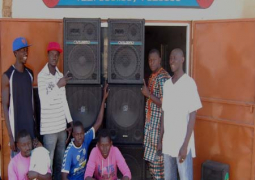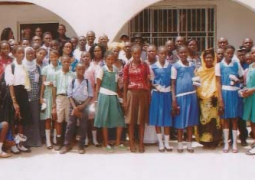
The Gambia Committee on Traditional Practice Affecting the Health of Women and Children (Gamcotrap), on 14 February 2014, joined the rest of the world in rising for justice to end gender-based violence, which is called V-Day.
The event began with a march-past from Traffic Light to TANGO Office where various speakers spoke on the significance of the day.
In her statement, Mary Small of Gamcotrap, quoted the United Nations Secretary General, Ban Ki-Moon, who in 2008 said, “There is one universal truth, applicable to all countries, cultures and communities: violence against women is never acceptable, never excusable, and never tolerable.”
She described the day as another important day in the history of The Gambia where they are all rising to stop violence against women, adding that the definition of violence extends from emotional or financial abuse and threats, to bodily harm and murder.
“These include domestic violence, rape, sexual assault, early/forced marriages, female genital mutilation, violence against women in prostitution and human trafficking for sexual exploitation,” she stated.
She said VAW was happening at the workplace, institutions, on the street and at homes, adding that statistics on VAW are grave and needs urgent actions.
“The UN report has stated that more than one in three women had experienced at least one incident of domestic violence by a current or former partner. 800,000 women are sexually assaulted every year and every week over 15,000 women are sexually assaulted,” she indicated.
She said the WHO’s recent global prevalence figures on VAW indicate that 35% of women worldwide have experienced either intimate partner violence or non-partner sexual violence in their lifetime.
On average, she added, 30% of women who have been in a relationship have reported that they have experienced some form of physical or sexual violence by their partner and globally, as many as 38% of murders of women are committed by an intimate partner.
She said that such data was not available for The Gambia, but the Multiple Indicator Cluster Surveys (MICS) conducted by UNICEF in The Gambia in 2010 stated that violent disciplinary acts on children have risen from 82.4 per cent in 2006 to 90.3 per cent in 2010.
Marriage before the age of 18 years was 46.5 per cent; the national prevalence rate of FGM was 76.3 per cent and approval of the continuation of FGM was 64.2 per cent, she further said.
The report also indicated that people’s attitudes supporting domestic violence have risen from 74 per cent in 2006 to 74.5 per cent in 2010, she said, adding that this was of crucial concern to activists and justifies the need for the One Billion Rising campaign in The Gambia.
“Violence against women is a significant public health problem, as well as a fundamental violation of women’s human rights. It is not confined to any particular political or economic system, but it is prevalence in every society in the world,” she stated.
She added that it cuts across boundaries of wealth, race and culture. It is an expression of historical and cultural specific values and standards which are today still executed through many and political institutions that foster women’s subservience and discrimination against girls and women.
“Therefore, we should not pretend that VAW is a Western affair as this is right here in our midst,” Mrs Small further said.
“Violence against women also costs society dearly. The cost of providing increased public services (including health, legal and social services) and the lost economic output of the affected women could run into billions of dalasi,” she pointed out.
Madi Jobateh, who chaired the programme, Amie Bojang-Sissoho, co-chair, Ousman Yabo, Executive Director of TANGO, Fatou Kinteh of the UNFPA, and lawyer Sagarr Jahateh of FLAG, all delivered befitting remarks on the subject matter.




